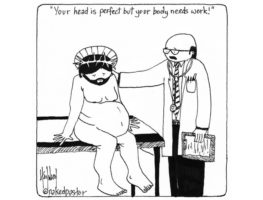I recently had the chance to invite two brothers in Christ into my workplace.
The three of us are architects. The two of them each have thriving local architectural practices while I teach design to public high school students. I think I have the best gig, but I realize not everyone wants to spend his whole workday with teenagers.
My school encourages us to hold periodic meetings that connect local professionals with students, giving students the chance to meet and learn from people currently doing the work. These meetings provide me with the opportunity to invite friends into my school, friends whose lives and design work I admire and who I want my students to learn from.
Our meeting ended with the bell, meaning students and teachers had to rush to get to class. As students straightened up desks and chairs I tried to hurry my friends out so they could get to their busy days and I could get to my class. But one of them didn’t come. He was too preoccupied with helping the students rearrange the tables and chairs for class.
If there’s anything church people know how to do it’s setting up and breaking down tables and chairs. After years of transitioning spaces from potlucks to worship services to youth group game rooms it becomes second nature. My friend had carried this aspect of church life into my workplace.
Bringing faith to work
Those of us who are employed in workplaces that are not explicitly connected to our Christianity often wonder how to connect our life of following Christ with the daily work we do. Depending on which tradition we come from we may feel called to be a nice person at the office, provide well for our nuclear families, tell coworkers about Jesus, liberate the oppressed, or transform the culture. Or maybe all of these at the same time.
The pressure that these narratives create is enormous. I’ve watched friends bounce from career to career trying to find the right thing. I’ve seen people live in anxiety in their work, wondering if they’re doing something that matters. Some have abandoned the church, centering their lives on the social justice work they do instead. Is something wrong with the project of connecting our faithfulness to Jesus with our work outside the church? I’ve seen people live in anxiety, wondering if they’re doing something that matters. Click To Tweet
The recent book by David Fitch, Faithful Presence: Seven Disciplines That Shape the Church for Mission, is not about our work outside the church.
Though the title connects the book to James Davison Hunter’s To Change the World, the structure of Faithful Presence is akin to Richard Foster’s classic Celebration of Discipline. Many of the disciplines Foster describes are practices that I can choose to participate in individually. All of the disciplines Fitch lists require me to be a part of a community committed to the practices. These two sets of disciplines, taken together, cast a vision of a people fully faithful to the practices and presence of its messiah.
After having spent a considerable amount of time in two different professions I’ve found that the community practices, or being the people of God together, are the ones that are currently the most needed if we want to be faithful followers of Christ in our workplaces outside the church. Like my friend helping students set up tables and chairs, we carry our church life into our work. We should carefully tend to this life together.
When my friend was setting up tables and chairs a number of things were happening. An ingrained habit of manipulating the physical objects kicked in—when to slide a table, when to lift a chair, how to navigate around others—but a social habit kicked in as well.
In his position as an invited guest of honor among young people, many of whom were people of color, he found it important to step down into service, honoring the ones that often receive the least honor among us. He stepped into the work without the awkwardness many adults bring to interactions with teenagers and without calling attention to himself. It was as if he had been practicing.
Practice can mean two different things.
I can practice in preparation for the “real thing,” a performance or a big game. Or I can practice something, like medicine or law, in contrast to merely studying it, such that practice is the “real thing.” If we can keep both of these forms of practice in mind we can view our life together as a rehearsal for being on mission in the world and we can view our communal life as the real thing.
In Faithful Presence Fitch uses the image of a circle in various stages of enclosure to get this idea across. A circle drawn with its entire perimeter intact represents our intimate practices among those of us already committed to following Christ. Our gathering around the table for the Eucharist is the paradigmatic close circle.
A dotted circle represents our communal practices that we invite others into, like shared meals where we invite our neighbors to join us. A circle only half enclosed represents practices where we take our community out into our neighborhoods. We go out humbly as guests into the spaces where the hurting and the broken are gathered together, and we look for the presence of Christ already there. Jesus sending his disciples out in pairs into villages is our model for the half circle.
I’d like to propose a fourth configuration of Fitch’s circles.
It’s a circle we each carry with us when we step outside our shared life, like a belt or a hula hoop around our waist. The practices of being a people together gradually saturate our lives so that even when we’re apart from our communities our reality is shaped by our life in Christ and not by the workplaces, the economy, and the world’s systems of power that normally have no problem soaking into our souls.
Let’s look at a few of the disciplines Fitch describes to see how this might work.
Chapter Six describes practices of being with “the least of these,” those whose lives are characterized by injustice, in our gatherings and in our neighborhoods. We practice this by being present with the poor, the homeless, the outcasts, not as projects but as peers and friends. Unless we live this way as a people we may not notice the absence of their voices when we sit around our conference tables making decisions that may profoundly affect their lives.
As we recognize their absence we can also explore ways to bring their real concerns, and maybe even their real presence, into our everyday business decisions.
The practices of reconciliation described in Chapter Four invite us to try out Paul’s directive to address the way others have wronged us in ways that are honest, direct, private, and gracious. This is neither a cheap reconciliation of generalized niceness nor a public calling out of grievances. It stands in contrast to our common practice of leaving our communities the first time someone hurts us. If we’ve practiced, we can begin to see possibilities for growth and healing. Click To Tweet
If we haven’t practiced reconciliation in our differences as a people we will easily drift into the standard workplace practices of gossip and backstabbing. If we’ve practiced, we can begin to see possibilities for growth and healing in all the complex relationships we encounter in our workplaces.
Being with children, the discipline described in Chapter Seven, is a biblical practice many churches ignore by sending the young away to their own specialized gatherings for the entirety of our times together. Yet for me as a teacher the practice of being with the young is critical to my carrying God’s justice into my workplace. I’m trained and credentialed as an architect yet God called me into being a public school teacher.
Most days I delight in this, but often the voices that declare that “those who can do; those who can’t teach” crowd my head. We live in a country that radically devalues the young by devaluing those who work with them and by using our schools as profit centers and political pawns. I desperately need to spend a great deal of time among friends that turn this upside down by visibly honoring the young so that I can re-form my reality in my daily work.
If we don’t participate in committed long-term practices of following Christ together, the ways we seek to live faithfully outside our gatherings, especially in our workplaces, will be at best clumsy, intermittent, and unnatural. If we do inhabit these practices it will, over time, make us strange, like we’re living in a different age, a different world, a different kingdom.
Living in this strange other space and time is exactly what we need in order to navigate our way through our workplaces. We can face how far away from God’s justice our world truly is without succumbing to fear and hopelessness. And we can humbly participate in God’s worldwide cross-generational work of making all things new.



Missio Alliance Comment Policy
The Missio Alliance Writing Collectives exist as a ministry of writing to resource theological practitioners for mission. From our Leading Voices to our regular Writing Team and those invited to publish with us as Community Voices, we are creating a space for thoughtful engagement of critical issues and questions facing the North American Church in God’s mission. This sort of thoughtful engagement is something that we seek to engender not only in our publishing, but in conversations that unfold as a result in the comment section of our articles.
Unfortunately, because of the relational distance introduced by online communication, “thoughtful engagement” and “comment sections” seldom go hand in hand. At the same time, censorship of comments by those who disagree with points made by authors, whose anger or limited perspective taints their words, or who simply feel the need to express their own opinion on a topic without any meaningful engagement with the article or comment in question can mask an important window into the true state of Christian discourse. As such, Missio Alliance sets forth the following suggestions for those who wish to engage in conversation around our writing:
1. Seek to understand the author’s intent.
If you disagree with something the an author said, consider framing your response as, “I hear you as saying _________. Am I understanding you correctly? If so, here’s why I disagree. _____________.
2. Seek to make your own voice heard.
We deeply desire and value the voice and perspective of our readers. However you may react to an article we publish or a fellow commenter, we encourage you to set forth that reaction is the most constructive way possible. Use your voice and perspective to move conversation forward rather than shut it down.
3. Share your story.
One of our favorite tenants is that “an enemy is someone whose story we haven’t heard.” Very often disagreements and rants are the result of people talking past rather than to one another. Everyone’s perspective is intimately bound up with their own stories – their contexts and experiences. We encourage you to couch your comments in whatever aspect of your own story might help others understand where you are coming from.
In view of those suggestions for shaping conversation on our site and in an effort to curate a hospitable space of open conversation, Missio Alliance may delete comments and/or ban users who show no regard for constructive engagement, especially those whose comments are easily construed as trolling, threatening, or abusive.